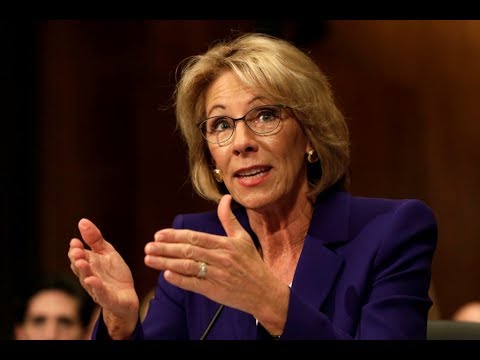Last week, Secretary of Education Betsy DeVos confirmed what we have long suspected: she and President Trump are prioritizing private education at the expense of an equitable K-12 public education for all.


In DeVos’s America, this is what education looks like:
- Before- and after-school programs and anti-bullying and student health initiatives are relics of a more equitable time;
- Latinx and Black students—who are historically most impacted by the achievement gap—are left behind in public schools, where classrooms are without consistent instruction and libraries full of outdated materials;
- Drop-out rates skyrocket and graduation rates plummet for students of color; and
- Wealthy families continue to send their children to private and religious schools, but tuition is cheaper because the federal government is picking up part of the tab.
Here’s what this means for California:
- Black, Latinx, and American Indian youth in low-income schools will lose some 3,600 teachers, making classes bigger and individual supports rare;
- Highly qualified teachers and administrators will be harder to come by in low-income schools, which typically have high Black, Latinx and American Indian student enrollment rates;
- Millions of dollars in much needed resources are derailed away from California’s students; and
- School vouchers become the norm, putting money in the pockets of religious organizations, investors and wealthy families.
Secretary DeVos is actively pushing your federal representatives to not only support her draconian cuts to education, but also funnel the limited remaining funds into private and religious schools that operate free from the educational and anti-discrimination standards.
Here’s how you can help us stand behind California’s students:
- Resist the budget. Tell your congressperson and senator that this budget will harm our students and must not be passed;
- Demand more money for our kids. The Department of Education, which accounts for less than 3% of the entire federal budget, is already underfunded. There is no denying it—students need adequate educational materials to learn, and schools need money to provide those resources.
- Educate your friends and family and challenge the school choice myth that the administration is peddling.
Trump and DeVos want to dismantle programs that help bridge educational gaps that exist both nationally and locally. California received $4.09 billion in federal funds for elementary and secondary education programs this year, and stands to lose over $450 million dollars—about 10% of the existing budget. Far from fake news, this budget confirms an objective truth: Trump and DeVos are abandoning America’s needy and vulnerable children.